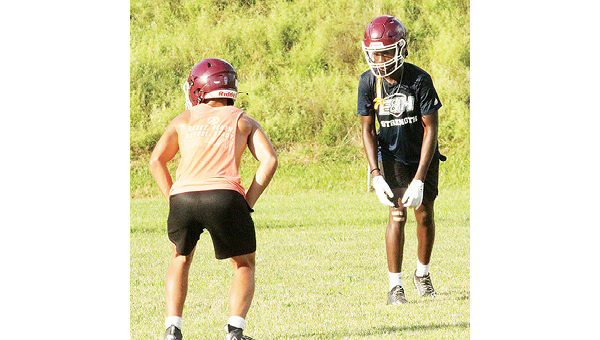Memories that don’t fade
Published 3:07 pm Friday, May 29, 2020






|
Getting your Trinity Audio player ready...
|
There are some things that a pandemic just cannot erase — the memories of war and lives lost on the battlefield. Monday was Memorial Day and because of COVID-19 there were no local ceremonies. At the War Memorial downtown there was a sprinkling of memories — a red, white and blue wreath, a few people quietly walking along the Wall of Honor, searching for names. Across the street at the War Memorial where large granite black stones contain the names of those who from Carter County gave their lives during America’s wars, a lone woman sat quietly on a bench. When she started to leave, she walked over to the Vietnam Memorial, patted the marker and quietly walked away. Some memories linger; they just cannot be erased by time or by a pandemic.
My family is fortunate in that it has no names inscribed on those memorial markers. Across the street, my four brothers’ names are etched on memorial bricks, denoting their military service. Three nephews have also served their country in the military.
However, I took time out Monday to visit the Memorial and to read the names on those memorial markers. On the Vietnam marker were the names of a few friends from high school — Michael P. Oliver and Robert Shaffer. On other markers were names of people that I had written stories about for special Memorial Day and Veterans Day editions of the STAR from the past as well as “On the Wall” features of the past.
One of the reasons I visited the Memorial was because of one name in particular — Lt. John P. Keys, who was killed in World War II. He was the pilot of a B-17 Flying Fortress. He and seven other members of his nine-member crew were killed in action after the aircraft was shot down during a bombing mission over occupied France near a small village called Perigny on August 8, 1944. That was three years before I was born.
Keys was 26 years old at the time of his death and has a memorial marker at Happy Valley Memorial Park.
Last week, an old friend, Ida Hinkle of Hampton, came by the STAR and left a bag which contained a half dozen old Spinnerettes (a small magazine printed monthly by the rayon plants from the late 1930s to the early 1950s). Inside one the Spinnerettes was a story about Lt. John P. Keys and his crew. It was a radio broadcast describing a mission prior to his fateful 27th mission, when he crashed near Caen, France.
The story titled “An American Hero” is printed in its entirety. It was originally published in a Chicago paper.
––––––
“The pilot cocked his head and listened to the engines of his Flying Fortress — the YEHUDI. German Focke-Wulf 180’s had knocked out two of his three engines and had scored hits on the third one — there was no doubt about that.
“The crippled Fortress was flying home from her successful raid on an aircraft plant at Leipzig. The Yanks had dropped their bombs square on their targets and started back to their English base when the Focke-Wulfs swarmed down on them and poured lead into the Fortress. The pilot, Lt. John P. Keys of Elizabethton, Tenn., glanced at his instrument panel. The giant plane was losing altitude fast — zooming down at a dangerous speed.
“Throw out everything that can’t shoot,” he ordered his crew. The men gave up their thick flack suits, ripped out seats and discarded them, and tossed out guns and heavy armor plates. But still the YEHUDI kept sinking — she fell from 23 thousand feet to 14 thousand. The radio operator, Sgt. Frank Thomas of Rutland, Vermont, crawled out of his trousers and shirt and tossed them overboard. As they floated out the window, he drawled, “My pants and my all I give to my country.”
“Staff Sergeant Joseph Constanza of New York got his feet caught in the ship’s slipstream while hurling out a few stray bolts and nuts. Other crew members rushed to him and pulled him back in the plane just as suction almost dragged him out.
“Keys looked up and saw the Focke-Wulfs in the sky above him. Each minute he thought they would attack again. Meanwhile, the Fortress continued her downward dive, dropping to nine thousand feet. Lt. Keys worked over engines No. 2 and No. 3, but the only motor giving him any pull was No. 1. Keys was sure they were going to have to jump. He was so sure that he laced his shoes up tightly. But he wasn’t going to desert the Fortress until it was absolutely necessary.
“We’ll ride our luck and see what happens,” Lt. Keys told his men. Then he added, “If you have anything else to throw out — throw it.”
“Cries of ‘Throw out the navigation,’ humorously followed that suggestion. However, the navigator, who weighed 200 pounds, objected strongly, pointing out that he had a leave coming up the next day. Probably it was the guns that were tossed overboard, but it might have been the radio operator’s pants. At any rate YEHUDI leveled off shortly below nine thousand feet. Then the crippled Fortress ran into help — a flight of United States Thunderbolt Fighters.
“’Look at those beautiful sons of guns,” Keys shouted to his men.
“They looked and they grinned, and they used a few strong words. With the Thunderbolts as an escort, YEHUDI limped along on her one good engine. And Keys brought her home safe.”
It was not long after that mission that Keys and his crew, except for one man, died in a mission over France.
Much like this mission, which occurred in June 1944, Keys and seven members of his nine-member crew two months later were killed in action after their aircraft was shot down during a bombing mission over occupied France.
Lt. Keys was the holder of the Air Medal and the Distinguished Flying Cross with three Oak Leaf Clusters.
He enlisted in the Army Dec. 26, 1941, and received his training at the following fields: Moody Field, Valdosta, Ga.; Hendrix Field, Sebring, Fla.; Bainbridge, Ga.; Maxwell Field, Montgomery, Ala.; Carlstrom Field, Arcadia, Fla.; Dyersburg; and Kearney Field, Nebraska.
On Aug.30, 1943, he received his wings as a pilot with the rank of Second Lieutenant. He picked his crew at Salt Lake City, Utah in October 1943. From there he went to Dyersburg, then to Kearney Field, Neb., and on April 2, 1944, he flew to England. In June 1944 he received his rank as First Lieutenant. He was on his 27th mission when he failed to return to his base.
Keys was working in the engineering department at American Bemberg when he entered the military.
––––––
War often seems so far physically from us, but regardless of how far we are from the battles, they still affect someone around us. Just as COVID-19 has had a limited effect on our town compared to other places such as New York City; Miami, Fla.; Los Angeles, Calif.; New Orleans, La.; and other places. In Carter County, there have only been 19 cases with one death. Overall, America has surpassed 100,000 deaths.
There are still heroes. The heroes of today are nurses, doctors, and EMTs who are battling the coronavirus, many of whom have given their lives for the cause. Here at home, it is the grocery workers and even educators, who have had to change their method of teaching because of school closings.
We never have to look far to find a battle, and when we find the battle, we find heroes. They live among us every day. Just like the lady sitting on the bench at the War Memorial Monday….apparently, she had sacrificed in the past to war.











